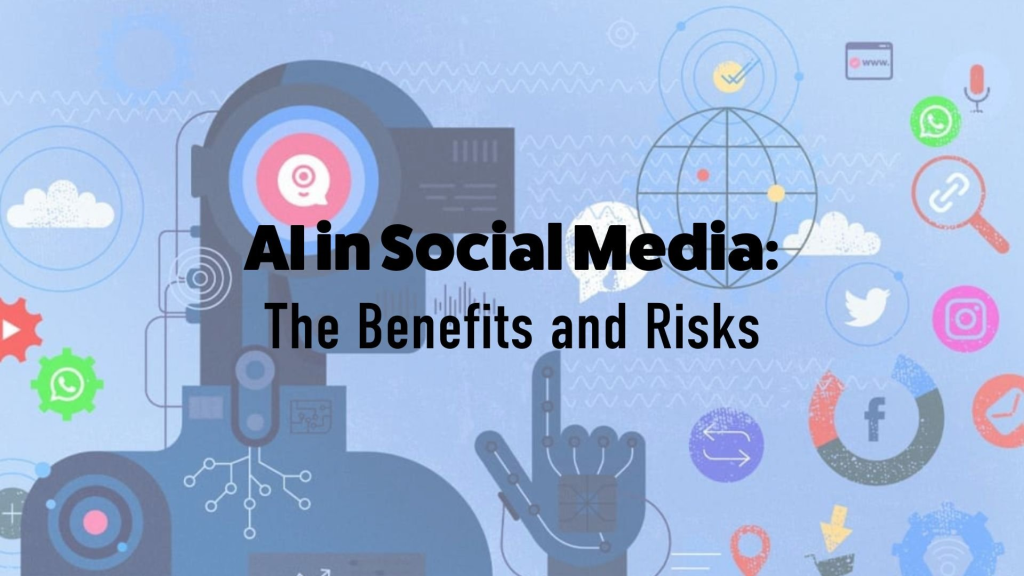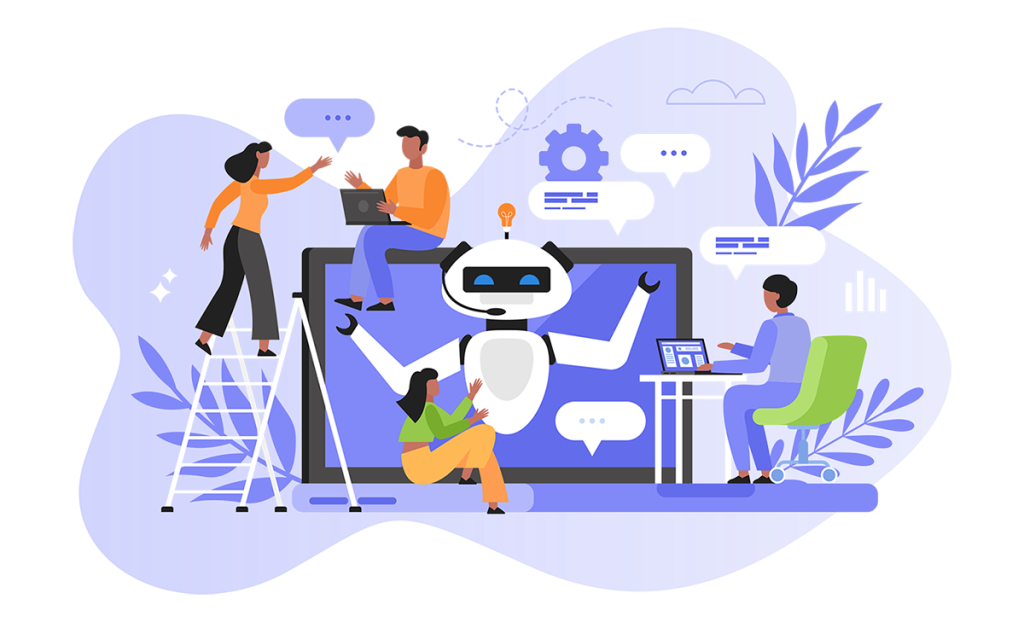Content is king and social media is the platform for building relationships with your audience, staying consistent, creative, and relevant is essential. With the growing demand for high-quality content, many businesses, influencers, and content creators have turned to AI to help streamline their content creation process. But as with any tool, there are both benefits and challenges when it comes to using AI for social media content creation.

In this article, we’ll break down the pros and cons of using AI to enhance your social media strategy, helping you understand when to leverage AI and when to exercise caution.
Pros of Using AI for Social Media Content Creation
1. Increased Efficiency and Time-Saving
One of the most significant advantages of using AI for content creation is the sheer amount of time it can save. AI-powered tools can quickly generate social media posts, captions, and even visual content like infographics and videos. This allows content creators and social media managers to focus on other strategic aspects, such as community engagement, campaign analysis, and brand building.
- Example: AI writing tools like ChatGPT can generate multiple caption variations in minutes, while tools like Canva use AI to suggest layouts, fonts, and colors based on the content you’re creating.
Benefit: You can maintain a consistent posting schedule and spend more time engaging with your audience rather than drafting individual posts.
2. Content Personalization and Customization
AI can help personalize content based on user behavior, preferences, and past interactions. Platforms like Facebook and Instagram have advanced algorithms that can target specific audiences based on their interests. With AI, businesses can automate the creation of personalized messages, content recommendations, and ads that are highly relevant to the audience.
- Example: AI tools like Lately analyze past posts and generate new content that resonates with your target audience’s preferences, increasing the likelihood of engagement.
Benefit: Personalization can lead to higher engagement, more meaningful interactions, and an increase in conversion rates.
3. Data-Driven Insights and Optimization
AI tools provide valuable insights by analyzing social media metrics and user behavior. By using AI-powered analytics, content creators can optimize their posts, learn what type of content works best, and adjust their strategy accordingly. Tools like BuzzSumo can help identify trending topics and hashtags, while Hootsuite can suggest the best times to post based on your audience’s activity.
- Example: Social media platforms like Twitter and LinkedIn offer AI-powered analytics tools that analyze engagement data to help improve future content strategies.
Benefit: Data-driven insights allow for smarter decision-making, reducing trial and error and ensuring your content performs well.
4. Consistency and Scalability
AI ensures that content creation remains consistent across different platforms. It can schedule posts in advance, generate content for multiple platforms, and even adjust the tone or format according to the platform’s requirements. This is particularly beneficial for businesses or influencers who need to manage multiple accounts at once.
- Example: Tools like Buffer or Hootsuite use AI to automate posting schedules, ensuring that your content goes live at optimal times without manual intervention.
Benefit: AI helps maintain a regular presence on social media, improving brand visibility and engagement without sacrificing quality.
5. Cost-Effective Content Creation
AI can lower the cost of content creation. By automating repetitive tasks, such as writing captions, generating images, and responding to customer queries, businesses can reduce the need for large content teams or external resources. This can be particularly helpful for smaller businesses or creators on a budget.
- Example: AI tools like Jasper (formerly Jarvis) can generate blog posts, social media captions, and even email marketing content in a fraction of the time and cost it would take a human writer.
Benefit: Save money on hiring additional staff, agencies, or content creators, while still maintaining a strong social media presence.

Cons of Using AI for Social Media Content Creation
1. Lack of Human Touch and Creativity
While AI is excellent for automating repetitive tasks and generating content quickly, it often lacks the human creativity, emotional intelligence, and nuance that makes content truly resonate with audiences. Social media is all about storytelling, relatability, and building authentic connections—something AI struggles with.
- Example: AI might generate content that is grammatically correct, but it may fail to evoke the right emotions or include cultural references that make the post more relatable.
Drawback: Over-reliance on AI can lead to content that feels robotic, generic, or disconnected from your audience’s emotional needs.
2. Risk of Over-Automation
While AI can help automate many aspects of social media management, it’s important not to sacrifice the personal touch. Automated interactions, such as direct messages or comments, can feel impersonal and may negatively impact user engagement. Additionally, too much automation can make your brand appear less human and more like a faceless corporate entity.
- Example: Automated responses to customer complaints or feedback might lack empathy and fail to resolve issues effectively, damaging the relationship with your audience.
Drawback: Over-automation can lead to a lack of authentic engagement and customer dissatisfaction.
3. Quality Control Issues
AI-generated content, while efficient, may not always meet the high-quality standards you expect. AI tools can sometimes produce content that is shallow, lacks depth, or doesn’t fully align with your brand voice. Additionally, there can be issues with the AI not understanding context or generating incorrect or biased content.
- Example: AI might generate captions that are grammatically correct but lack the wit or charm your brand is known for. Or worse, it may inadvertently generate inappropriate or irrelevant content.
Drawback: Relying solely on AI could lead to inconsistent content quality, requiring additional time for manual oversight and editing.
4. Dependence on Algorithms and Trends
AI tools rely heavily on algorithms and data patterns to generate content, which means that they are highly influenced by existing trends. While this can be beneficial for staying current, it can also lead to a lack of innovation or originality. AI might follow a trend that doesn’t fit with your brand or niche, or produce content that feels too similar to what everyone else is doing.
- Example: If you use AI to generate content based on trending topics, you might end up blending in with the noise, rather than standing out with something truly unique.
Drawback: AI might limit creativity by pushing content in directions based solely on existing trends and patterns rather than original thought.
5. Ethical and Legal Concerns
AI-generated content can sometimes inadvertently raise ethical or legal issues. For example, AI tools might scrape publicly available content to generate new ideas, which could lead to plagiarism or unintentional copyright infringement. Additionally, if AI is used to automate customer service responses, it might violate privacy regulations if not done correctly.
- Example: An AI tool could inadvertently generate content that closely mirrors an existing post, leading to issues with copyright or intellectual property.
Drawback: Legal risks associated with plagiarism, privacy violations, and unintentional biases may arise when using AI-generated content without proper oversight.
If you are looking for AI tools for your social media, you can check our topic on 5 AI Tools to Boost Your Social Media Strategy

Final Thoughts
AI is undoubtedly a game-changer when it comes to creating social media content. From saving time and money to boosting personalization and efficiency, the pros are significant. However, there are also important considerations to keep in mind. Over-reliance on AI could lead to a loss of the human touch, creativity, and authenticity that are so crucial in social media marketing.
The key to successful AI usage lies in finding the right balance: leveraging AI for efficiency and data-driven insights, while also maintaining a personal connection with your audience. By using AI wisely and ensuring that it complements your unique voice and creativity, you can enhance your social media strategy without losing the essence of what makes your brand or content authentic and engaging.



